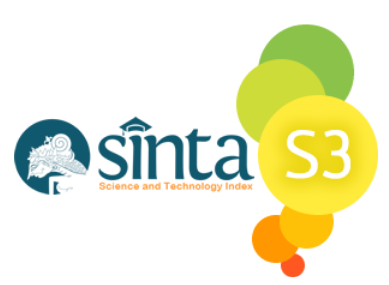THE EFFECTIVENESS OF DEMONSTRATION AND EXPERIMENTATION LEARNING METHODS FOR EMPOWERING PINE FOREST COFFEE FARMERS BENDOSARI VILLAGE PUJON-MALANG INDONESIA
Abstract
An effective learning method is very important for the success of a learning goal, especially for the success of learning that involves the village community. The village communities have very diverse abilities and knowledge, in general an activity is carried out in accordance with daily habits, so it is not easily changed. However, the villagers already have a lot of experience, especially related to their daily livelihoods. The characteristics of such objects require an effective learning innovation in order to increase the knowledge they do not yet have. An effective learning method is a form of activity to improve the culture of literacy in the community. The demonstration learning methods and field experiments proposed as learning methods are expected to be in accordance with the characteristics of coffee farmers in Bendosari Village in the context of empowering coffee farmers in Bendosari Village. The purpose of this study is to identify how effective the demonstration learning methods and field experiments for empowering coffee farmers in Bendosari Village, Pujon-Malang Indonesia. The results showed that the demonstration learning method and field experiment very effective in increasing the knowledge and field ability of coffee farmers in Bendosari Village. Increase farmers knowledge and ability by 20%.
Keywords
Full Text:
PDFReferences
Abimanyu, S. (2009). Strategi Pembelajaran. Jakarta: Departemen Pendidikan Nasional.
“Arti Literasi: Pengertian, Tujuan, Manfaat dan Jenis-Jenis Literasi”. 2019. Retrieved from https://www.maxmanroe.com/vid/umum/arti-literasi-adalah.html on November 22th.
Arends. (1997). Model-Model Pembelajaran Inovatif Berorientasi Konstuktivitis. Jakarta: Prestasi Pustaka Publisher.
Collin, G. & Dixon, H. (1991). Integrated Learning. Australia: Bookshelf Publishing.
Djamarah, B. S. and Zain, A. (2006). Strategi Belajar Mengajar. Jakarta: Rineka Cipta.
Frederick, B., Glaser M. D. & F.R.C.P. (1991). A Matter of Moral Perspective. British Journal of Addiction. Vol. 86(1), p.18-19.
Gijselaers, W. H. (1996). Connecting Problem-Based Practices with Educational Theory. In L. Wilkerson & W. Gijselaers (Eds.), Bringing Problem-Based Learning to Higher Education: Theory and Practice. New Directions in Teaching and Learning. No. 68, p.13-21.
Hadfield, J. (1986). Classroom Dynamic. Oxford: University Press.
Hakim, A. (2006). Analisis Pengaruh Motivasi, Komitmen Organisasi dan Iklim Organisasi terhadap Kinerja Pegawai pada Dinas Perhubungan dan Telekomunikasi Provinsi Jawa Tengah. JRBI. Vol. 2(2), p. 165-180.
Ibrahim, M. (2000). Pembelajaran Kooperatif. Surabaya: University Press.
Kardi, S. & Nur, M. (2000). Pengajaran Langsung. Surabaya: Universitas Negeri Surabaya Universiti Press.
Listianti, I. (2014). Pengaruh Metode Pembelajaran Demonstrasi terhadap Hasil Belajar Siswa pada Materi Jama’qasar pada Kelas VII MTs. Skripsi. Universitas Islam Negeri Syarif Hidayatullah, Jakarta.
Nasution. (2006). Kurikulum dan Pengajaran. Jakarta: PT Bumi Aksara.
Nata, A. (2009). Perspektif Islam tentang Strategi Pembelajaran. Jakarta: Kencana.
Neufeld, V. R. & Barrows, H. S. (1974). The “McMaster Philosophy”: an Approach to Medical Education. Journal of Medical Education, Vol. 49, p.1040-1050.
Nugroho, A. (2012). Penerapan Metode Eksperimen dalam Pembelajaran Ilmu Pengetahuan Alam untuk Meningkatkan Aktifitas Belajar Siswa Kelas IV Madrasah Ibtidaiyah Muhammadiyah Kapubaten Ketapang. Retrieved from https://media.neliti.com/media/publications/211924-penerapan-metode-eksperimen-dalam-pembel.pdf, on November 21th, 2019.
“Profil Desa Bendosari”. 2019. Retrieved from http://desa-bendosari.malangkab.go.id/index.php/first/artikel/114, on November 21th.
Roestiyah. (2001). Strategi Belajar Mengajar. Jakarta: Rineka Cipta.
Sagala, S. (2003). Konsep dan Makna Pembelajaran. Bandung: Alfabeta
Sanjaya, W. (2010). Strategi Pembelajaran Berorientasi Standar Proses Pendidikan. Jakarta: Kencana.
Sudjana. (2005). Metoda Statistika. Bandung: PT Tarsito.
Suherman, E. et al. (2003). Strategi Pembelajaran Matematika Kontemporer. Bandung: PT Remaja Rosdakarya.
Sumantri, Mulyani & Permana, J. (1998). Strategi Belajar Mengajar Jakarta: Proyek Pendidikan Guru Sekolah Dasar, Dirjen Dikti, Depdikbud.
Sumantri, Mulyani & Permana, J. (2001). Strategi Belajar Mengajar. Bandung: Maulana.
Sumiati & Astra. (2008). Metode Pembelajaran. Bandung: Wacana Prima.
Syamsu. (2009). Profesionalisme Guru dalam Pembelajaran. Makasar: CV Berkah Utami.
Teale, W. H. & Sulzby, E. (1986). Emergent Literacy as a Perspective for Examining How Young Children Become Writers and Readers. Norwood, NJ: Ablex.
Wadji, B. & Hizbi, T. (2016). Penerapan Metode Eksperimen dan Demonstrasi Berbasis Observasi Gejala Fisis ditinjau dari Kemampuan Awal Siswa pada Pembelajaran IPA. Jurnal Pendidikan Fisika, Vol. 4(2), p. 99-110(12).
Zuhaerini. (1983). Metodik Khusus Pendidikan Agama. Surabaya: Usaha Nasional.
DOI: https://doi.org/10.18551/erudio.6-2.4
Refbacks
- There are currently no refbacks.
Copyright (c) 2019 Erudio Journal of Educational Innovation

This work is licensed under a Creative Commons Attribution 4.0 International License.












